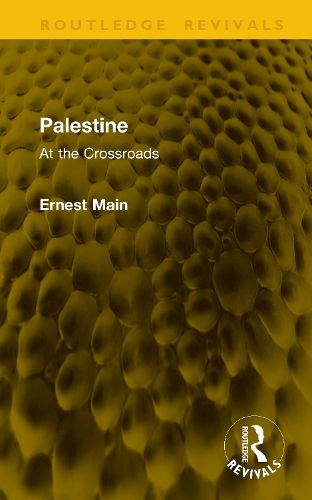Readings Newsletter
Become a Readings Member to make your shopping experience even easier.
Sign in or sign up for free!
You’re not far away from qualifying for FREE standard shipping within Australia
You’ve qualified for FREE standard shipping within Australia
The cart is loading…






Mandatory Palestine was established in 1920, and the British obtained the Mandate from the League of Nations in 1922. Jewish immigration and the rise of Nationalist movements characterized the following years, and the years between 1936 and 1939 saw the Palestinian Revolution against British rule. Originally published in 1937, this is a journalist's account of several months spent in Palestine, in the centre of a growing storm, where 'Jew and Arab are struggling for land which each feels to be rightfully his.' Although clearly written from an imperialist point of view, the book discusses how to order the affairs of Palestine and asks if there is any common objective to which both Jews and Arabs could work, whilst at the same time, safeguarding British interests in the region. The author acknowledges that then, as now, the 'Palestine Problem' is wider than Palestine itself. The writing and stance of the author reflects the prevailing British attitudes of the time, but the book is nevertheless an important part of the literature of the politics of the Middle East and sheds light on some of the origins of this complex region which persist today.
$9.00 standard shipping within Australia
FREE standard shipping within Australia for orders over $100.00
Express & International shipping calculated at checkout
Stock availability can be subject to change without notice. We recommend calling the shop or contacting our online team to check availability of low stock items. Please see our Shopping Online page for more details.
Mandatory Palestine was established in 1920, and the British obtained the Mandate from the League of Nations in 1922. Jewish immigration and the rise of Nationalist movements characterized the following years, and the years between 1936 and 1939 saw the Palestinian Revolution against British rule. Originally published in 1937, this is a journalist's account of several months spent in Palestine, in the centre of a growing storm, where 'Jew and Arab are struggling for land which each feels to be rightfully his.' Although clearly written from an imperialist point of view, the book discusses how to order the affairs of Palestine and asks if there is any common objective to which both Jews and Arabs could work, whilst at the same time, safeguarding British interests in the region. The author acknowledges that then, as now, the 'Palestine Problem' is wider than Palestine itself. The writing and stance of the author reflects the prevailing British attitudes of the time, but the book is nevertheless an important part of the literature of the politics of the Middle East and sheds light on some of the origins of this complex region which persist today.